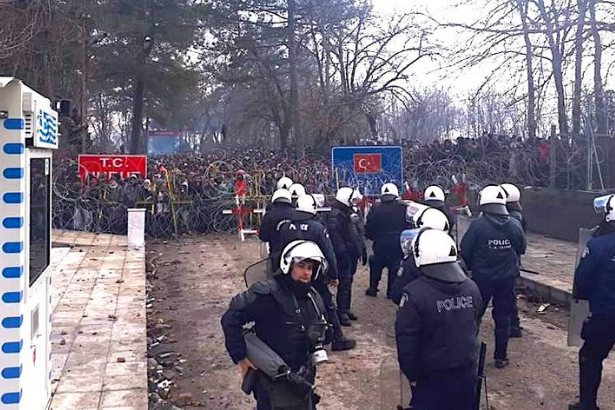Over 100 thousand refugees left Turkey for Europe after opening of borders: Turkish Interior Minister

‘‘The number of migrants who left our country through western province of Edirne is 100 thousand 577 as of 7.40 p.m.,’’ Turkey’s Minister of Interior, Süleyman Soylu, announced on his social media account on Monday.
Following the airstrike that killed 36 Turkish troops in Idlib on Feb.27, the Turkish government has decided to open its border gates, allowing refugees for free passage to Europe. As hundreds of refugees in Turkey started to arrive at the country’s borders with Greece and Bulgaria on Friday after Ankara’s decision, the Greek and Bulgarian governments have declared they would not allow any refugees to enter the European territories.
While Greek security forces attacked the refugees waiting in the border gates by using tear gas plastic bullets, stun grenades and pressurized water, Bulgaria deployed approximately 1,000 troops to its frontier with Turkey to prevent the refugee passage.
The Greek security forces have also put up razor wire barriers and deployed dozens of police officers behind the barricades to prevent the influx of refugees to Europe.
The border crossing of thousands of refugees continues via inflatable boats and through Doyran and Sarıcaali villages in Turkey’s western province of Edirne.
soL news reporter in the region told that the Greek police and soldiers are trying to stop refugees by beating and throwing them into the river.
On the other hand, the Turkish government uses every means available to take refugees across the border. The Turkish authorities send the refugees arriving at the center of Edirne province to the Doyran village, where is located on a riverbank for refugees to cross the border.
Refugees arriving at the Uppsala-Kipi Border Crossing are directed to the Sarıcaali village in a similar location with the Doyran village, soL news reporter also noted. Municipal buses and military vehicles provide service to take the refugees to these villages, while the bargaining between human smugglers and refugees is explicitly driven.
Refugees and asylum seekers, who have failed to cross the Greek border and wanted to return to Istanbul, have been blocked by the Turkish gendarmerie and police.


A refugee group trying to use a small boat to cross the Evros River into Greece from Turkey, photo: Sedat Suna/EPA.


Migrants waiting at the Turkish-Greek border, photo: Bulent Kilic/Agence France-Presse.
Meanwhile, the Greek Ministry of Foreign Affairs has denied the statistical data given by the Turkish Minister of Interior on the refugee number crossing to Europe.
‘‘Disinformation campaign by Turkish authorities continues. The reality: 10,000 people were prevented from entering Greek territory (all along Evros) from yesterday morning to this morning. 73 -unrelated to Idlib- persons illegally crossed, were arrested & accordingly prosecuted,’’ the Greek Ministry of Foreign Affairs stated on Sunday.
‘‘No one can cross the Greek border. All those attempting illegal entry, are effectively prevented from entering. Numbers cited by Turkish authorities are entirely false and misleading,’’ the Greek Ministry of Foreign Affairs also said regarding the issue.
Turkey hosts approximately 3.7 million Syrian refugees, while the European Union has provided billions of euros for ‘humanitarian aid’ in return for the Turkish government agreeing to stop the influx of migrants into Europe under a deal signed in 2016.
Ankara had guaranteed to prevent the flow of refugees and asylum seekers to the EU in return for €6 billion as part of the deal four years ago. Yet, the Turkish President Recep Tayyip Erdoğan often threatened the EU to reopen the border crossings for refugees from the Middle East to Europe, complaining that the EU has not paid out the €6 billion it promised.
However, it seems that Ankara’s decision regarding the opening of the border gates to Europe has been aimed to force the EU and NATO to provide ‘‘concrete’’ military support for the Turkish government’s new military operation against the Syrian government forces in Idlib.



